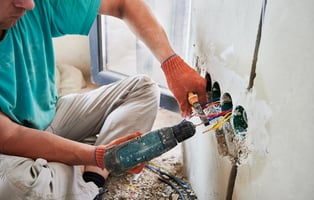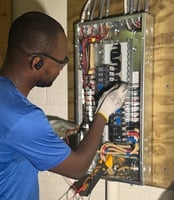The electrical wiring in your home is an unsung hero behind the scenes. It powers your lights,...
Hidden Hazards: What You Need to Know about Electrical Home Safety
 Maintaining a home is an ongoing process, yet many people wait until something stops working in the home before addressing these maintenance issues. However, it can save you time, money, and unnecessary stress to prevent problems before they occur. Your home’s electrical system is an excellent place to start.
Maintaining a home is an ongoing process, yet many people wait until something stops working in the home before addressing these maintenance issues. However, it can save you time, money, and unnecessary stress to prevent problems before they occur. Your home’s electrical system is an excellent place to start.
Common Electrical Hazards and Home Safety Concerns
Some electrical concerns are relatively benign, only causing minor issues, while others pose a more serious risk. However, even those that aren’t “hazardous” can take away from the comfort and convenience of your home.
Here are some of the more common electrical concerns you may run into with your electrical system, and how they can impact you:
- Tripping the breaker – Ever run the microwave and blender at the same time only to have the breaker trip? The good news is that tripping a breaker means your home stays safe. The demand for power by running two appliances at the same time exceeded the capability of that particular circuit. You may be tempted to reset the breaker and just carry on. Yet a tripping breaker is an indication that it may be time to assess your electrical needs. Maybe you ought to consider running an additional circuit or two to handle the ongoing electrical demands that your household requires. Modern kitchens in particular require much more power than kitchens in previous decades.
- Electrical surges – Lightening, damaged power lines, faulty appliances--all of these create the potential for electrical surges. Surges can happen as the demand for power in the community fluctuates. Problems or faults within the utility company's aging system will also produce electrical surges which can damage or destroy appliances and electronics in your home. There are a variety of surge protectors available, from the outlet power strip to a whole house surge protector installed in the electrical panel. We recommend the whole house surge protectors and use them in our own homes. Proper grounding of the property's electrical system as a whole is also recommended to mitigate the risks from electrical surges.
- Outdated and neglected electrical panels – Electrical codes are often considered strict. That’s because electricity can cause life-threatening electrical shocks, fire, and other high-risk scenarios. Your panel plays a crucial role in your home’s electrical system, and should be checked every few years for loose cables, water, rust and other indicators of deterioration. The panel should meet current codes, including updates to meet today's increased level of power usage.
- Flickering light – There are a number of potential reasons for flickering lights. Loose or frayed wiring is a common reason that lights flicker (if it’s not the bulb). This is considered a fire risk. The first place to check would be the circuits at the electrical panel. It is a very good idea to bring in an electrician for preventative maintenance on your electrical panel every few years, since the terminations may loosen over time. Alternatively, if the flickering is limited to one light fixture (or a group of fixtures controlled by one switch), the fixture or the associated switch may be worn out and would need to be replaced. NOTE: If lights only flicker briefly when switched on via a DIMMER switch, that is probably not a safety concern. This caveat is especially true with LED lights.
- Faulty switches and outlets – If an outlet or switch isn't working, it's essential to find out why. It may be something simple, or a sign of something more serious.
Devices that Support Electrical Home Safety
Any home – but particularly older homes – benefit from installing devices that support electrical home safety. Some of these include:
- Surge protectors – There are a variety of surge protectors, from a plug-in cord to whole house surge protection. Surge protectors can prevent damage to your home’s appliances and electronics.
- Grounding - The importance of proper grounding cannot be overstated in the world of electrical safety. Proper grounding in a home protects home appliances, electronics, and people in the house or building. In the event of a short circuit, ground wires are an additional path for electrical current to return safely to the ground without danger to anyone. When there is a short, the current passes onto a properly terminated ground and trips the circuit breaker instead of sending a shock to an end user. If a circuit is not properly grounded, a device cover plate or device itself could become energized, with the potential to seriously injure or, under certain conditions, even fatally shock an end user. A proper ground can also stabilize voltage levels, which can help to keep circuits from being overloaded and tripping, reducing potential electrical problems.
- AFCIs and GFCIs – Arc fault circuit interrupters (AFCIs) prevent electrical fires while ground fault circuit interrupters (GFCIs) were designed to prevent electrical shocks. The national and local electrical codes require GFCI receptacles where outlets are located near sources of water (mainly in kitchen, bathrooms, and exterior locations). Cities and counties are starting to require that AFCIs, a relatively new technology, be installed in electrical panels.
- Right sized panel for your electrical needs – Do you know your electrical panel’s electrical capacity? A safe home starts with a panel that supports your electricity usage. Updating and/or upgrading adds to your electrical home safety.
The Benefits of a Professional Electrical Safety Assessment
While there are plenty of DIY tips online, conducting your own electrical safety assessment is not advisable. Investing in a professional electrical safety assessment conducted by a trained and licensed electrician is hugely beneficial. Not only will potential problems and hazards be identified, but the electrician can help you to prioritize a list and identify the costs for what may need to be done.
During an assessment, our electricians will inspect the electrical panel and other main points of concern in a typical house. When you take a preventative stance, you are able to catch the little problems before they erupt into much larger, more costly repairs.
It’s easy to forget that your electrical system needs maintenance and upgrades too. After all, much of it is out of sight. Nonetheless, maintaining it has benefits, not the least of which includes keeping your home and family safe.



